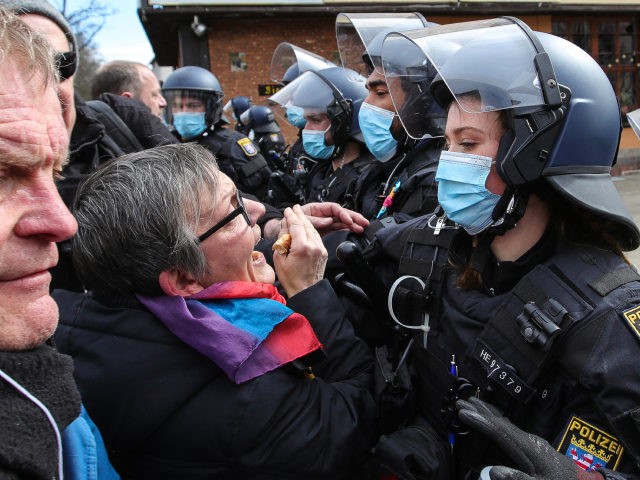Protests against coronavirus lockdowns in Germany, known as the “Querdenker” or “lateral thinking” movement, have been barred from gathering by regional courts in the country.
Bavaria’s Administrative Court ruled late Friday evening that demonstrations against Germany’s lockdown should be banned under the pretext of slowing the spread of the Chinese virus.
Saxony Higher Administrative Court followed suit, citing the existence of variants of the coronavirus and the belief that demonstrators could not feasibly abide by social-distancing diktats, according to the German public broadcaster Deutsche Welle.
The decision from the court has been made unappealable and applies to all demonstrations. The court, which presides over the city of Dresden, also prohibited a planned protest by the right-wing populist party Alternative for Germany (AfD).
The Querdenker anti-lockdown movement — which has been accused by German intelligence of having been infiltrated by extremists — has staged large-scale protests against the coronavirus restrictions, drawing some 20,000 people in the Saxony city of Leipzig in November.
Later that month, police in Berlin deployed water cannons to disperse an anti-lockdown protest at the German capital’s Brandenburg Gate landmark.
Police in Frankfurt also used water cannons to disperse Antifa radicals who attempted to shut down the Querdenker protest, which they claimed was spreading “Nazi propaganda”.
German Justice Minister Christine Lambrecht has said that police must take a tough stance against demonstrations against the lockdown, saying that a “crystal-clear red line must be drawn”.
“In addition to criminal prosecution, demonstrations must be broken up by the police,” she said.
“We cannot expect people to be very restrictive in their private lives while at the same time others are flouting all the rules at coronavirus demonstrations,” Lambrecht added.
Despite the ban on gatherings, thousands of people turned out to protest in the city of Stuttgart on Saturday, with at least 700 people being arrested for attending the ‘illegal’ rally. Police in the city said that they also had recorded over 1,000 breaches of the mask-wearing mandate.
Around 250 people also gathered in Cologne, under the banner of “no to curfews! Health protection instead of restricting our rights,” after the city imposed a curfew for the first time since the Second World War.
On Friday, German Chancellor Angela Merkel called upon lawmakers in the country to grant additional powers to the federal government to enforce lockdowns and curfews to slow the spread of the virus, saying: “The third wave of the pandemic has our country firmly in its grip.”
Follow Kurt Zindulka on Twitter here @KurtZindulka

COMMENTS
Please let us know if you're having issues with commenting.